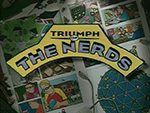 Narconon, a Church of Scientology organization, was one of my consulting firm’s biggest clients in 2003 and 2004. I personally sold Narconon all of its new computers, monitors, and networking equipment, for their Arrowhead and Chilocco campuses. I remember those were the years because Houston hosted the Super Bowl in 2004. I invited my contact at Narconon to attend a Super Bowl party. He did not visit for the Super Bowl because he was too busy running Narconon’s IT department in Oklahoma. However, I did see him the previous December when he came over to my house while visiting his family for the holidays. He was the healthiest and happiest he had ever been since I met him in the mid-1990’s. He had also started a new relationship, which would eventually become a marriage. Hating on Scientology seems to be the cool new thing for some people. I know Scientology can’t be all that bad based on my own personal observations of my friend at Narconon and details he told me about his experiences there. I am not a Scientologist and have not done business with Narconon in more than ten years. Based on my own independent research and life experience, there are Scientology concepts that I know to be true. As a non-Scientologist, here’s what I think I understand about some concepts in Scientology, and at Narconon, that are useful and applicable even if you do not formally practice Scientology.
Narconon, a Church of Scientology organization, was one of my consulting firm’s biggest clients in 2003 and 2004. I personally sold Narconon all of its new computers, monitors, and networking equipment, for their Arrowhead and Chilocco campuses. I remember those were the years because Houston hosted the Super Bowl in 2004. I invited my contact at Narconon to attend a Super Bowl party. He did not visit for the Super Bowl because he was too busy running Narconon’s IT department in Oklahoma. However, I did see him the previous December when he came over to my house while visiting his family for the holidays. He was the healthiest and happiest he had ever been since I met him in the mid-1990’s. He had also started a new relationship, which would eventually become a marriage. Hating on Scientology seems to be the cool new thing for some people. I know Scientology can’t be all that bad based on my own personal observations of my friend at Narconon and details he told me about his experiences there. I am not a Scientologist and have not done business with Narconon in more than ten years. Based on my own independent research and life experience, there are Scientology concepts that I know to be true. As a non-Scientologist, here’s what I think I understand about some concepts in Scientology, and at Narconon, that are useful and applicable even if you do not formally practice Scientology.
Creative Mind vs. Reactive Mind
Scientology’s core belief, as I understand it, is that each person is a unique individual with unlimited creative (i.e., analytical) potential. And the reactive mind is what inhibits each person from reaching their creative potential. You can’t create if your mind is constantly busy reacting. Memories, called engrams in Scientology-speak, are what cause your mind to react. Based on a memory, the reactive mind expects similar circumstances to play out in the same way. Auditing is the Scientology method of tracing these memories and eliminating them from obstructing a person’s creative potential. The e-meter is a religious artifact used during auditing as the tool to measure the physiological effect of a memory. The ultimate goal of auditing is to trace, and eliminate, all memories that cause a person to react, which Scientology refers to as reaching a state of Clear. The pursuit of Clear, remaining Clear, and going beyond Clear, are symbolically known as The Bridge to Total Freedom.
Word Clearing
Word clearing is the act of fully understanding the words you read, hear, think, and use. L. Ron Hubbard, the founder of the Church of Scientology, valued the power of the written word as sacred. LRH was a prolific author of various forms of both fiction and non-fiction. Indeed, LRH still holds the Guinness World Record for Most Published Works By One Author. According to some Scientologist essays I’ve read, using words you don’t understand, and quitting study of a subject because you don’t understand certain words, is the root of all human stupidity. Scientologists accomplish word clearing by looking up every word they read in a dictionary. Then, if they don’t fully understand a word in the definition, they look up the definition of that word, too. The result is a more complete and precise understanding of what you read. That enables a person to more competently and accurately interact with the world. Accuracy in choice of words is fundamental to setting goals and achieving those goals.
Suppressive Persons
Suppressive persons are the external equivalent to bad memories. If bad memories are what cause a person to sabotage themself, then suppressive persons serve the same purpose. To these pathetic individuals, if you won’t ruin your own life then they feel obligated to find a way to do it for you. Suppressive persons, often abbreviated “SP’s”, are imprisoned by the reactive mind such that they destroy not only their own potential, but make it their business to destroy the potential of everybody around them. Suppressive persons do this not only through their actions, but also their words. An SP will do, or say, anything to keep those around them from being unique in any way. Suppressive persons exist to remind you of who you supposedly are, or worse who you were, to keep you from ever being who you could become.
Disconnection
Disconnection is the external equivalent of auditing. Auditing is the process of getting rid of bad memories. Disconnection is the act of getting rid of suppressive persons. Since suppressive persons, by definition, will say or do anything they can to destroy anybody’s potential, the only way to deal with an SP is to remove that person from your life. That is often easier said than done. To an SP, anything they know about your life, or your plans, is a potential in-road to ruining everything for you. The more effort you make to be creative, and analytical, the more effort an SP will make to sabotage your success. And the closer you get to your goals, the more frequently suppressive persons seem to show up. They show up in larger numbers and are more forceful. If you’ve ever had somebody that you totally forgot about show up right as you are about to succeed at something, and that person seemingly for no reason says and does everything they can to hold you back, then that is the very essence of a suppressive person. The absolute only way to deal with such people is to keep them from knowing any of your business. And that is the act of disconnection.
Detoxification
Detoxification is an important part of treatment at Narconon facilities. In Scientology-speak, this is called the Purification Rundown. Narconon’s implementation of it is a secular version they call the Sauna Detox Program. The general idea is that trace amounts of all the chemicals and toxins you consume stay in your body. By routinely spending time in a sauna, sweating, and making sure your body gets proper vitamins and nutrition, you can cleanse yourself of all the gunk and contaminants that lead to various illnesses and health problems. For people with substance abuse problems, detoxification reduces and eliminates the chemical urge to relapse.
My friend spoke wonders of the detox regimen at Narconon. When I saw him after he had been there awhile, he just plain looked different. He was not merely “clean and sober”. My friend radiated a totally different energy. He seemed genuinely brighter when you looked at him and he was more awake and alive. I’ve adopted the detox regimen in my own life and I personally feel like it makes a difference. Whenever I’m feeling unhealthy or less than 100%, I make it a point of spending some time, several evenings in a row if possible, sweating as much as I can in a sauna or hot tub. I replace the water and minerals lost through sweat with fresh water and vitamins. No matter how much I procrastinate and don’t want to make the time to do it, I always feel way better afterwards and sleep better, too.
Narconon
I have no financial incentive or ulterior motive in writing this post. I have not done business with Narconon, or any Scientology organization, in more than ten years. My contact at Narconon also left there permanently many years ago. My only goal is to provide some positive context about, as I understand it, general Scientology beliefs and also Narconon. My contact at Narconon did not originally go there to manage their IT department. When he first went there in either 2002 or 2003, it was for treatment. He had an increasing substance problem that had taken over his life. When I first met him, he was working for his brother’s credit processing company in Houston, which was also a client of mine. Working with him professionally, I saw over time that my friend’s substance problem had gotten progressively worse. When I didn’t see or hear from him for a year or so, I kinda expected to find out later that he either ended up in jail or overdosed. Instead, I got a call from him at Narconon telling me that he had gone there to get help and felt better than he could ever recall. He felt so strongly about the program that he decided to stay and establish their IT department, which didn’t even exist at the time. My friend went from being a patient at Narconon to using it to rebuild his life and career. And as I said, he eventually started a healthy relationship and got married. I know that Scientology and Narconon help people because I have personally observed their effects on my friend with my own eyes and hugged him after he got better with my own arms.
What Is True Is What Is True For You
 Once again, criticizing Scientology seems to be the cool new thing for some people. Many of the haters appear to be former life-long Scientologists that took Scientology as far as it could get them, personally and professionally, and then decided the only way to go further with Scientology was to destroy it. I’ve seen that HBO documentary and marathoned every episode of that tv show. Among former Scientologists, even it’s biggest critics believe that Scientology’s core program may still be the best self-help system ever developed. So why not just leave well enough alone? Since it obviously helped your career and was worth your time to go all the way up The Bridge, why ruin it for everybody else?
Once again, criticizing Scientology seems to be the cool new thing for some people. Many of the haters appear to be former life-long Scientologists that took Scientology as far as it could get them, personally and professionally, and then decided the only way to go further with Scientology was to destroy it. I’ve seen that HBO documentary and marathoned every episode of that tv show. Among former Scientologists, even it’s biggest critics believe that Scientology’s core program may still be the best self-help system ever developed. So why not just leave well enough alone? Since it obviously helped your career and was worth your time to go all the way up The Bridge, why ruin it for everybody else?
Scientology uses a demonstration that is often taken out of context and mocked. You’re asked to look at something in front of you that you’ve never touched, ask yourself if it really exists, and then touch it. If you’ve never seen something with your own eyes, or ever touched it with your own hands, then how do you know it is real? According to L. Ron Hubbard, the point of that act is: “What is true for you is what you have observed yourself. And when you lose that, you have lost everything.”
 Triumph of the Nerds: The Personal Computer
Triumph of the Nerds: The Personal Computer
 Prizeo Brings Together Celebrities And Charities To Increase Awareness And Raise Money
Prizeo Brings Together Celebrities And Charities To Increase Awareness And Raise Money
 Venture Deals Explains Modern Venture Capital
Venture Deals Explains Modern Venture Capital
 Five Years of Y Combinator Universe
Five Years of Y Combinator Universe





![Apple iOS 7 iBeacon Is A Big Opportunity: A New Platform for Micro-Location Using Bluetooth LE [Video]](../wp-content/plugins/wordpress-23-related-posts-plugin/static/thumbs/17.jpg)